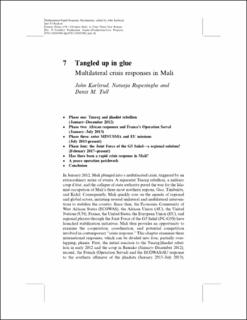Tangled up in glue: Multilateral crisis responses in Mali
| dc.contributor.author | Karlsrud, John | |
| dc.contributor.author | Rupesinghe, Natasja | |
| dc.contributor.author | Tull, Denis M. | |
| dc.date.accessioned | 2023-07-24T11:11:32Z | |
| dc.date.available | 2023-07-24T11:11:32Z | |
| dc.date.created | 2018-12-27T12:22:39Z | |
| dc.date.issued | 2019 | |
| dc.identifier.isbn | 9781138543980 | |
| dc.identifier.uri | https://hdl.handle.net/11250/3081111 | |
| dc.description.abstract | In January 2012, Mali plunged into a multifaceted crisis, triggered by an extraordinary series of events. A separatist Tuareg rebellion, a military coup d’état, and the collapse of state authority paved the way for the Islamist occupation of Mali’s three most northern regions, Gao, Timbuktu, and Kidal. Consequently, Mali quickly rose on the agenda of regional and global actors, initiating several unilateral and multilateral interventions to stabilize the country. Since then, the Economic Community of West African States (ECOWAS), the African Union (AU), the United Nations (UN), France, the United States, the European Union (EU), and regional players through the Joint Force of the G5 Sahel (FC-G5S) have launched stabilization initiatives. Mali thus provides an opportunity to examine the cooperation, coordination, and potential competition involved in contemporary “crisis response.” This chapter examines these international responses, which can be divided into four, partially overlapping, phases: First, the initial reaction to the Tuareg/jihadist rebellion in early 2012 and the coup in Bamako (January-December 2012); second, the French (Operation Serval) and the ECOWAS/AU response to the southern offensive of the jihadists (January 2013-July 2013); third, the aftermath of Serval and the deployment of the UN Multidimensional Mission for Stabilization in Mali (MINUSMA) and other missions/operations (July 2013-present); and fourth and finally, the deployment of the FC-G5S (February 2017-present). | |
| dc.description.abstract | Tangled up in glue: Multilateral crisis responses in Mali | |
| dc.language.iso | eng | en_US |
| dc.relation.ispartof | Multinational Rapid Response Mechanisms: From Institutional Proliferation to Institutional Exploitation | |
| dc.rights | Attribution-NonCommercial-NoDerivatives 4.0 Internasjonal | * |
| dc.rights.uri | http://creativecommons.org/licenses/by-nc-nd/4.0/deed.no | * |
| dc.subject | FN | |
| dc.subject | UN | |
| dc.subject | Mali | |
| dc.subject | Fredsoperasjoner | |
| dc.subject | Peace operations | |
| dc.subject | EU | |
| dc.title | Tangled up in glue: Multilateral crisis responses in Mali | en_US |
| dc.type | Chapter | en_US |
| dc.description.version | acceptedVersion | |
| dc.subject.nsi | VDP::Internasjonal politikk: 243 | |
| dc.subject.nsi | VDP::International politics: 243 | |
| dc.source.pagenumber | 133-154 | en_US |
| dc.identifier.cristin | 1647343 | |
| cristin.unitcode | 7471,13,0,0 | |
| cristin.unitname | Fred, konflikt og utvikling | |
| cristin.ispublished | true | |
| cristin.fulltext | postprint | |
| cristin.qualitycode | 2 |
Tilhørende fil(er)
Denne innførselen finnes i følgende samling(er)
-
Academic books and articles collection. Open access publishing by NUPI employees. [563]
Also including chronicles, papers, research reports, etc. from other publishers than NUPI. -
Publikasjoner fra Cristin - NUPI [1429]

